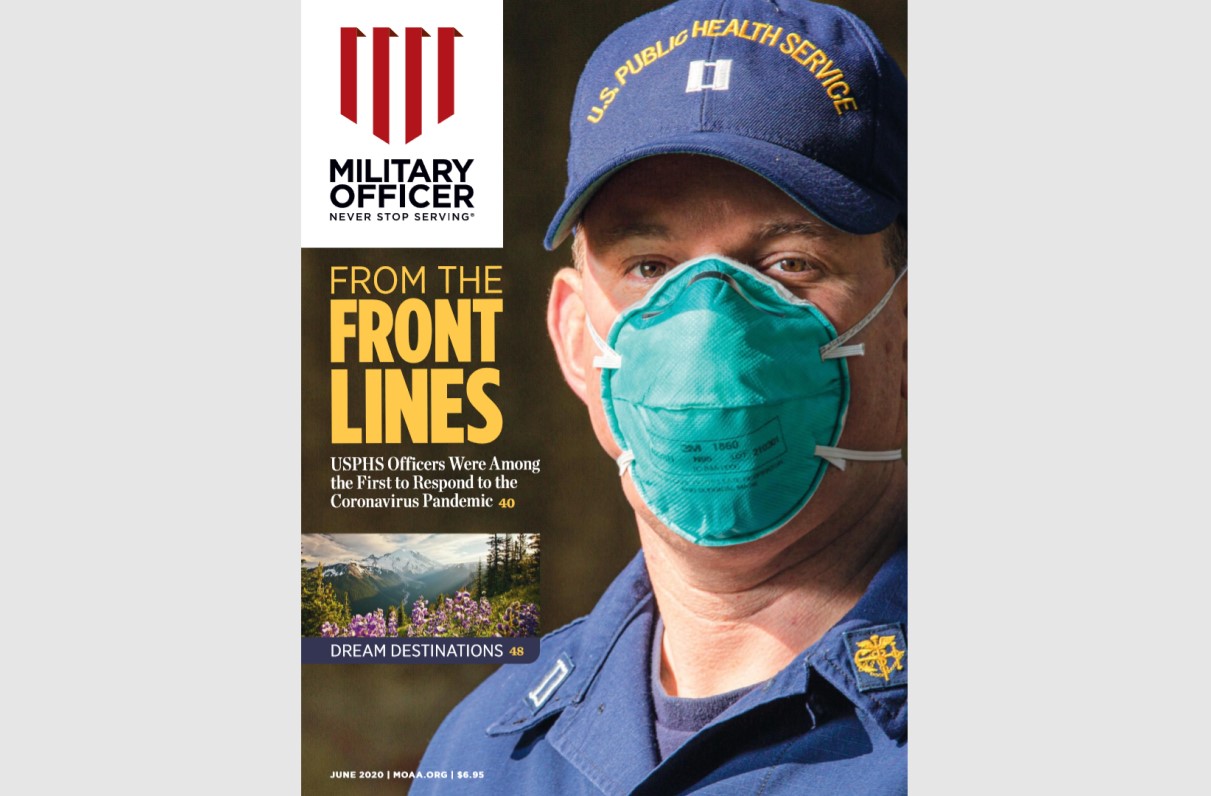(This article originally appeared in the June 2021 issue Military Officer, a magazine available to all MOAA Premium and Life members. Learn more about the magazine here; learn more about joining MOAA here.)
Lt. Andrew Patrick Brown, a microbiologist, has spent almost half of the past year traveling to provide care and relief in the fight against COVID-19.
It has been a long journey since he appeared on the cover of Military Officer last June, representing the U.S. Public Health Service. During his 158 days on the road, he deployed to California to assist with the Diamond Princess cruise ship returning from Japan; Whiteriver Indian Hospital on Arizona’s Fort Apache Indian Reservation; the Commissioned Corps Headquarters in Rockville, Md.; and twice to the Guam Public Health Laboratory on the Pacific island.
His expertise was critical to helping laboratories test for the virus.
“It’s been a busy year for me,” said Brown, a MOAA Life Member.
[RELATED: ‘Stepping Into Chaos’: USPHS Officers on the COVID-19 Fight]
On his first deployment, Brown served as a logistics officer assisting responders with housing while they cared for people aboard the Diamond Princess. The outbreak aboard the ship led to 700 infections and seven deaths in the early days after the virus arrived in the U.S.
The following month, Brown deployed to the laboratory on Guam, helping conduct COVID testing. He also assisted the staff with applying for a grant to acquire more equipment for the laboratory. On his second deployment to Guam, he helped set up the new equipment purchased through the grant.
He said he knew that his return presence to Guam gave the laboratory staff confidence the federal government was supporting its efforts. Brown said the most fulfilling part of his work with USPHS is meeting the people and experiencing the different cultures he encounters in his work.
[FROM 2020: On the Front Lines: USPHS Officers and the COVID-19 Pandemic]
“I found that to be really fulfilling and interesting,” he said. “Just kind of getting to know these people and having this kind of cultural exposure.”
Brown said the corps has proven its signifificance. “After the Ebola epidemic and COVID, I don’t think anyone can argue the importance of public health,” he said. “The war we fight as Public Health Service officers is as silent and unseen as the pathogens that cause these diseases. And in our 200 years, from the beginning of the Marine Hospital Service to the highly educated, diverse and professional USPHS Commissioned Corps of today, there has never been a truce or even a cease-fire in that war. “
Brown is a former Marine, one of those servicemembers often welcomed home in joyous ceremonies. But as a Public Health Service officer, he’s used to quietly working, often unheralded.
“As a service, we’re never training because we’re always in the fight, and due to this, we never really get to celebrate a victory. The public doesn’t get to see USPHS officers standing proudly over a vanquished enemy,” Brown said. “For us, it’s just on to the next battle ... like never-ending wars that we’re fighting, to advance the health and safety of the nation.”
Are You Getting the Most Out of Your MOAA Membership?
MOAA offers exclusive discounts on a wide range of things including travel and event deals, home security, home appliances, college prep courses, pet insurance, and more!

